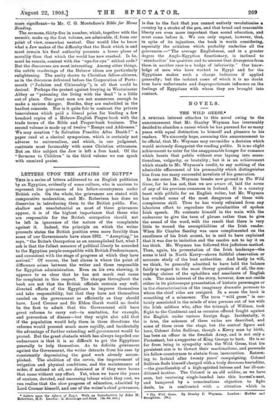LETTERS UPON THE AFFAIRS OF EGYPT.* Tars is a series
of letters addressed to an English politician by an Egyptian, evidently of some culture, who is anxious to represent the grievances of his fellow-countrymen under. British rule. On the whole, the grievances are stated with comparative moderation, and Mr. Robertson has done no disservice in introducing them to the British public. For, shallow and unsubstantial as most of these grievances appear, it is of the highest importance that those who are responsible for the British occupation should not be left in ignorance of the nature of the complaints against it. Indeed, the principle on which the writer proceeds states the British position even more forcibly than some of our Governments have since 1882. " Accepting," he says, " the Britwh Occupation as an accomplished fact, whit I ask is that the fullest measure of political liberty be accorded to the Egyptian people compatible with British Predominance, and consistent with the stage of progress at which they have arrived." Of course, the last clause is where the point of difference arises between the writer and those responsible for Egyptian administration. Even on his own showing, it appears to us clear that he has not much real cause for complaint in this respect. The charges throughout the book are not that the British officials restrain any well- directed efforts of the Egyptians to improve themselves and take responsibility, but that they have not themselves carried on the government as efficiently as they should have. Lord Cromer and Sir Eldon Gorst would no doubt be the first to admit that the Government still have great reforms to carry out—in sanitation, for example, and prevention of disease—but they might also add that if the population would help them in these directions the reforms would proceed much more rapidly, and incidentally the advantage of further extending self-government would be proved. But the great obstacle which has always impeded our endeavours is that it is so difficult to get the Egyptians generally to help themselves. As to definite grievances against the Government, the writer detracts from his case by consistently depreciating the good work already accom- plished. The abolition of the corvee, the improvement of irrigation and physical conditions, and the maintenance of order, if noticed at all, are dismissed as if they were boons that came without any effort. Yet, when we know the years of anxious, devoted, and unceasing labour which they cost, we can realise that the slow progress of education, admitted by Lord Cramer himself, and.one of the -writer's chief grievances, * Lettere upon the Affairs of Egypt. With an Introduction by John M. Robertson, M.P. London : 0. ifoutleoge and Sons. fEs. Si net.]
is due to the fact that you cannot entirely revolutionise a country by a stroke of the pen, and that bread and reasonable liberty are even more important than sound education, and must come before it. We can only repeat, however, that, in spite of its injustices, the book is worth considering, especially the criticism which probably underlies all the grievances t--" The average Englishman, and in a greater degree the Anglo-Egyptian functionary, is inclined to standardize' his qualities and to assume that divergence from them in another race is a badge of inferiority." Our know- ledge of men who have worked iu Egypt and for the Egyptians makes such a charge ludicrous if applied generally ; but the isolated cases of which it is no doubt true have unfortunate and disproportionate influence on the feelings of Egyptians with whom they are brought into contact.


































 Previous page
Previous page